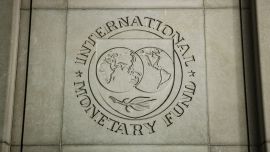The International Monetary Fund reduced borrowing costs for some of the world’s most indebted nations, making a concession to partners that have ramped up criticism of fees that they see as unjustly punitive at a time of higher interest rates.
The IMF’s executive board has agreed to cut what are known as surcharges, fees imposed on top of regular interest payments for countries that borrow more than their allotted share or take longer to repay IMF loans. The burden of those fees have been carried mainly by a handful of the Fund’s biggest borrowers including Argentina, Egypt, Ukraine and Ecuador.
Managing Director Kristalina Georgieva said Friday that the move will lower IMF borrowing costs for members by 36 percent, or US$1.2 billion every year. The number of countries paying surcharges in fiscal year 2026 will fall to 13 from 20, she said.
Whether that will be enough to satisfy critics of the programme remains an open question. Leaders from Argentina to Brazil have called for the surcharges to be suspended. And the relief is paltry compared with the US$1.62 trillion in global dollar-denominated debt outstanding in emerging markets, including $US132 billion due for next year, according to data compiled by Bloomberg.
Georgieva is set to host global financial leaders for meetings in Washington this month and wanted to signal a willingness to address indebted nations’ concerns. She said the reform would raise the threshold at which some surcharges are imposed and reduce their margin over the prevailing interest rate.
The Washington-based Fund has long imposed the fees as a way to discourage its biggest borrowers from becoming too reliant on its support. The IMF executive board rebuffed pressure to remove or suspend the surcharges entirely.
They remain an essential part of IMF borrowing and “provide incentives for prudent borrowing,” Georgieva said.
The fees have gone to filling the Fund’s precautionary balances, the money on hand to protect against possible losses. But the IMF already reached a US$34-billion target for those balances ahead of schedule earlier this year, easing the need to continue collecting the fees.
by Eric Martin & Jorgelina do Rosario, Bloomberg



















Comments